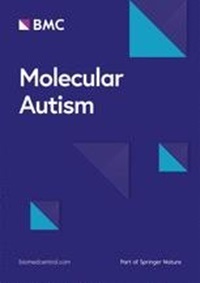粒细胞巨噬细胞集落刺激因子诱导的自闭症谱系障碍患者巨噬细胞通过分泌促炎细胞因子对神经元树突产生不利影响
IF 5.5
1区 医学
Q1 GENETICS & HEREDITY
引用次数: 0
摘要
越来越多的证据表明,外周组织和中枢神经系统的免疫功能障碍和炎症与自闭症谱系障碍(ASD)的神经发育缺陷有关。据报道,自闭症谱系障碍患者的血浆、血清和外周血单核细胞中促炎细胞因子的表达水平升高。这些细胞因子的表达水平与 ASD 行为障碍和症状的严重程度有关。在之前的一项研究中,我们小组报告了粒细胞-巨噬细胞集落刺激因子诱导的巨噬细胞(GM-CSF MΦ)中肿瘤坏死因子-α(TNF-α)的表达以及GM-CSF MΦ/M-CSF MΦ(巨噬细胞集落刺激因子诱导的巨噬细胞)中TNF-α的表达比率,ASD患者明显高于典型发育(TD)患者。然而,巨噬细胞和高表达细胞因子如何影响神经元的机制仍有待研究。为了阐明巨噬细胞对人类神经元的影响,我们使用了一种人类诱导多能干细胞衍生神经元与从五名TD患者和五名ASD患者外周血单核细胞中获得的分化巨噬细胞的共培养系统。所有参与者均为男性,日裔。我们的共培养实验结果表明,GM-CSF MΦ通过分泌促炎细胞因子(白细胞介素-1α和TNF-α)影响神经元树突的生长。来自ASD患者的巨噬细胞比来自TD患者的巨噬细胞产生的影响更严重。我们研究的主要局限性在于样本量较小,且性别偏向男性;使用了人工极化的巨噬细胞;无法直接观察来自同一个体的神经元和巨噬细胞之间的相互作用。我们的共培养系统揭示了在白细胞介素-1α和TNF-α的介导下,GM-CSF MΦ对ASD患者神经元的非细胞自主不良影响。这些结果可能支持了ASD的免疫功能紊乱假说,为了解其病理提供了新的视角。本文章由计算机程序翻译,如有差异,请以英文原文为准。
Granulocyte macrophage colony-stimulating factor-induced macrophages of individuals with autism spectrum disorder adversely affect neuronal dendrites through the secretion of pro-inflammatory cytokines
A growing body of evidence suggests that immune dysfunction and inflammation in the peripheral tissues as well as the central nervous system are associated with the neurodevelopmental deficits observed in autism spectrum disorder (ASD). Elevated expression of pro-inflammatory cytokines in the plasma, serum, and peripheral blood mononuclear cells of ASD has been reported. These cytokine expression levels are associated with the severity of behavioral impairments and symptoms in ASD. In a prior study, our group reported that tumor necrosis factor-α (TNF-α) expression in granulocyte–macrophage colony-stimulating factor-induced macrophages (GM-CSF MΦ) and the TNF-α expression ratio in GM-CSF MΦ/M-CSF MΦ (macrophage colony-stimulating factor-induced macrophages) was markedly higher in individuals with ASD than in typically developed (TD) individuals. However, the mechanisms of how the macrophages and the highly expressed cytokines affect neurons remain to be addressed. To elucidate the effect of macrophages on human neurons, we used a co-culture system of control human-induced pluripotent stem cell-derived neurons and differentiated macrophages obtained from the peripheral blood mononuclear cells of five TD individuals and five individuals with ASD. All participants were male and ethnically Japanese. Our results of co-culture experiments showed that GM-CSF MΦ affect the dendritic outgrowth of neurons through the secretion of pro-inflammatory cytokines, interleukin-1α and TNF-α. Macrophages derived from individuals with ASD exerted more severe effects than those derived from TD individuals. The main limitations of our study were the small sample size with a gender bias toward males, the use of artificially polarized macrophages, and the inability to directly observe the interaction between neurons and macrophages from the same individuals. Our co-culture system revealed the non-cell autonomous adverse effects of GM-CSF MΦ in individuals with ASD on neurons, mediated by interleukin-1α and TNF-α. These results may support the immune dysfunction hypothesis of ASD, providing new insights into its pathology.
求助全文
通过发布文献求助,成功后即可免费获取论文全文。
去求助
来源期刊

Molecular Autism
GENETICS & HEREDITY-NEUROSCIENCES
CiteScore
12.10
自引率
1.60%
发文量
44
审稿时长
17 weeks
期刊介绍:
Molecular Autism is a peer-reviewed, open access journal that publishes high-quality basic, translational and clinical research that has relevance to the etiology, pathobiology, or treatment of autism and related neurodevelopmental conditions. Research that includes integration across levels is encouraged. Molecular Autism publishes empirical studies, reviews, and brief communications.
 求助内容:
求助内容: 应助结果提醒方式:
应助结果提醒方式:


